Building URLs In C# Without Concatenation Or Interpolation
[C#, .NET]
When dealing with the web, you will often require to deal with URLs.
Like so:
// Build a HttpClient object
var client = new HttpClient();
// Download the contentent of the URL as a string asynchronously
var result = await client.GetStringAsync("https://localhost");
Often, you will require to specify the port. You’d typically do it like this:
Note: Much as I am using values for parameters in these examples, interpret them as variables
var result = await client.GetStringAsync("https://localhost:" + 5000.ToString());
Or, more cleanly, using string interpolation, like this:
var result = await client.GetStringAsync($"https://localhost:{5000}");
Things get a bit more complicated if you have to specify a querystring
await client.GetStringAsync($"https://localhost:{5000}/Customers?Height=10&Weight=70");
This is very brittle and prone to errors if you are generating the query string (and the entire URL) for that matter. You have to keep track of a bunch of things:
- The number and positions of the
/ - The
? - The number and positions of the
& - URL encoding special characters
There is a better way to do this.
If you look at the documentation of most objects that take URL as parameters, they almost all support passing the URL as a string.
Take this for HttpClient GetStringAsync
They also almost all support passing the URL as a URI object, like this

Given it is a URI object, we can safely construct a URL using the full functionality of dedicated, typed objects using the UriBuilder object.
We can do the following:
var builder = new UriBuilder("https", "localhost", 5000, "Customers", $"?Height={10}");
await client.GetStringAsync(builder.Uri);
This is better, but still has a problem: you have to do the hard work to set and encode the query string correctly.
In this case, you are responsible for constructing this segment correctly:
"?Height=10"
Suppose it was more elaborate:
Height of 10
Weight of 70
BirthYear of 2000
You will have to do this:
$"?Height={10}&Weight={70}&BirthYear={200}"
Or better still,
var query = new Dictionary<string, string>()
{
{"Height","10"},
{"Weight" , "70"},
{"SkinColor", "Brown"}
};
// Project the dictionary into a collection of name/value pairs and join them into a string
var queryString = string.Join('&', query.Select(q => $"{q.Key}={q.Value}"));
var builder = new UriBuilder("https", "localhost", 5000, "Customers", $"?{queryString}");
Much better.
The challenge here, as you can see, is you still have to do a lot of heavy lifting to generate the querystring. This can be done as an extension method.
Or, better yet, you an use a nuget library like Flurl.Http that has added a lot of extension methods to support precisely this scenario,
The code above can be rewritten as follows:
// Create an anonmymous type with our values
var queryParameters = new
{
Height = 10,
Weight = 70,
BirthYear = 2000
};
// Build the base url
var url = "https://localhost:5000/"
// Append the path
.AppendPathSegment("Customers")
// Set the querystring
.SetQueryParams(queryParameters);
// Invoke the request
await client.GetStringAsync(url);
The library is versatile enough to also work with Uri objects, but through a custom Url object. We can reuse our code that sets the various parts of the Uri
// Create an anonymous type with our values
var queryParameters = new
{
Height = 10,
Weight = 70,
BirthYear = 2000
};
// Build the base url
var url = new Url(new UriBuilder("https", "localhost", 5000, "Customers").Uri)
// Set the querystring
.SetQueryParams(queryParameters);
// Invoke the request
await client.GetStringAsync(url);
This code is much cleaner, easier to maintain and easier to support.
The code is in my Github.
Happy hacking!